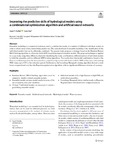Mostrar o rexistro simple do ítem
Improving the predictive skills of hydrological models using a combinatorial optimization algorithm and artificial neural networks
| dc.contributor.author | Cea, Luis | |
| dc.contributor.author | Farfán-Durán, Juan F. | |
| dc.contributor.other | Enxeñaría da Auga e do Medio Ambiente (GEAMA) | es_ES |
| dc.date.accessioned | 2024-02-15T14:53:54Z | |
| dc.date.available | 2024-02-15T14:53:54Z | |
| dc.date.issued | 2023 | |
| dc.identifier.citation | Farfán, J. F., & Cea, L. (2023). Improving the predictive skills of hydrological models using a combinatorial optimization algorithm and artificial neural networks. Modeling Earth Systems and Environment, 9(1), 1103-1118. https://doi.org/10.1007/s40808-022-01540-1 | es_ES |
| dc.identifier.uri | http://hdl.handle.net/2183/35621 | |
| dc.description.abstract | [Abstract:] Ensemble modelling is a numerical technique used to combine the results of a number of different individual models in order to obtain more robust, better-fitting predictions. The main drawback of ensemble modeling is the identification of the individual models that can be efficiently combined. The present study proposes a strategy based on the Random-Restart Hill-Climbing algorithm to efficiently build ANN-based hydrological ensemble models. The proposed technique is applied in a case study, using three different criteria for identifying the model combinations, different number of individual models to build the ensemble, and two different ANN training algorithms. The results show that model combinations based on the Pearson coefficient produce the best ensembles, outperforming the best individual model in 100% of the cases, and reaching NSE values up to 0.91 in the validation period. Furthermore, the Levenberg-Marquardt training algorithm showed a much lower computational cost than the Bayesian regularisation algorithm, with no significant differences in terms of accuracy. | es_ES |
| dc.description.sponsorship | Open Access funding provided thanks to the CRUE-CSIC agreement with Springer Nature. This study is financed by the Galician government (Xunta de Galicia) as part of its pre-doctoral fellowship program (Axudas de apoio á etapa predoutoral 2019) Register No ED481A-2019/014. | es_ES |
| dc.description.sponsorship | Xunta de Galicia; ED481A-2019/014 | es_ES |
| dc.language.iso | eng | es_ES |
| dc.publisher | Springer | es_ES |
| dc.relation.uri | https://doi.org/10.1007/s40808-022-01540-1 | es_ES |
| dc.rights | Atribución 3.0 España | es_ES |
| dc.rights.uri | http://creativecommons.org/licenses/by/3.0/es/ | * |
| dc.subject | Ensemble model | es_ES |
| dc.subject | Artificial neural networks | es_ES |
| dc.subject | Hydrological model | es_ES |
| dc.subject | Water resources | es_ES |
| dc.title | Improving the predictive skills of hydrological models using a combinatorial optimization algorithm and artificial neural networks | es_ES |
| dc.type | info:eu-repo/semantics/article | es_ES |
| dc.rights.access | info:eu-repo/semantics/openAccess | es_ES |
| UDC.journalTitle | Modeling Earth Systems and Environment | es_ES |
| UDC.volume | 9 | es_ES |
| UDC.startPage | 1103 | es_ES |
| UDC.endPage | 1118 | es_ES |
| dc.identifier.doi | 10.1007/s40808-022-01540-1 |






